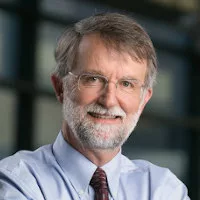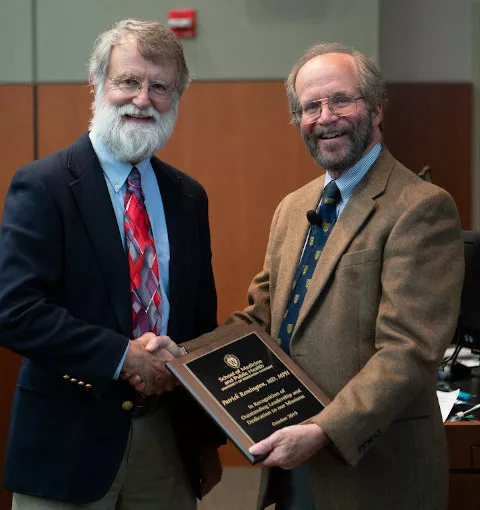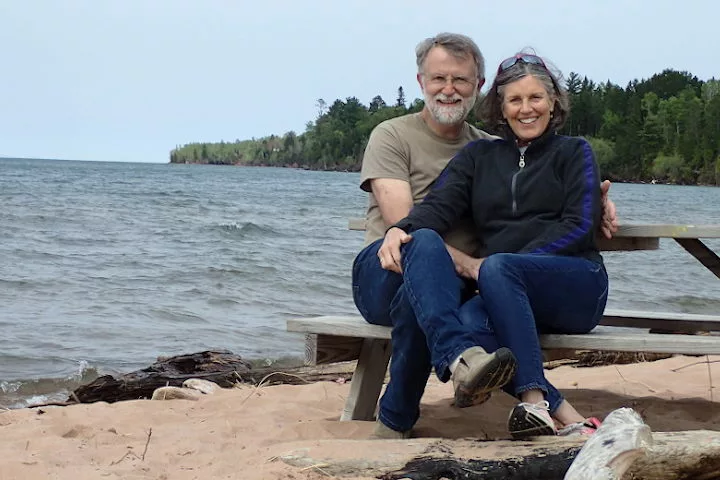Outstanding Women of Color
Melissa Metoxen (left) and Jennifer Edgoose were honored by UW–Madison in recognition of their efforts in advocacy, community building and scholarly research.
In October 2019, when Dean Robert N. Golden, MD, presented the Folkert Belzer Award to Patrick L. Remington, MD ’81, MPH, the recognition was a fitting bookend to Remington’s long and distinguished career as a public health practitioner, researcher, educator and leader.

Succinctly summing up the honoree’s contributions, Golden said, “Pat is an accomplished researcher whose work has directly impacted the health of our state. He’s been recognized for excellence in teaching and is sought after as a mentor and advisor to students. Through his work on the County Health Rankings and countless other projects and advisory roles, he has helped connect the school to the communities we serve. Finally, his leadership during our transformation to become an integrated school of medicine and public health has helped position the school uniquely for 21st century medicine and academic health care.”
For Remington, who retired with emeritus status in July 2019 from his position as the associate dean for public health, the opening bookend of his career occurred in part by chance. As a fourth-year medical student at the UW Medical School (now the School of Medicine and Public Health), he eagerly looked forward to an international elective in Zaire. But when civil unrest caused the cancellation of that trip, he implemented Plan B: an internship at Wisconsin’s state health department. The experience allowed him to explore questions that had begun to interest him as he prepared for a career in primary care. Why do some people get sick and others don’t? How can we prevent diseases before they occur? Indeed, these became the questions he would spend a lifetime investigating and helping academic medicine to address.
Recalling his experience at the Wisconsin Department of Health Services, Remington notes the mentorship of Jeffrey P. Davis, MD, and James Vergeront, MD ’78, among those on a long list of former School of Medicine and Public Health faculty members and/or trainees who influenced his career. He also remembers how that elective allowed him to participate in research, get a taste of public health fieldwork and observe the challenges of communicating public health information to communities.
His mentors apparently saw potential in Remington, and word got back to the School of Medicine and Public Health’s highly regarded infectious disease expert, Dennis Maki, MD ’67, now an emeritus professor of medicine. Just after Remington graduated, and before he left for his internship at Virginia Mason Medical Center in Seattle, he met with Maki, who gave him some very specific advice — get a job at the Centers for Disease Control and Prevention (CDC) following his internship — and Maki arranged a CDC interview for him.
In 1982, Remington accepted a position at the CDC, where he spent two years assigned to the Michigan Department of Public Health followed by four years in Atlanta as a medical epidemiologist in the Division of Nutrition. During that period, he completed a preventive medicine residency and earned a master of public health degree from the University of Minnesota, as part of the CDC’s career development program. He also traveled to Somalia, Chad and Zaire as a CDC health surveillance and nutrition consultant to international health agencies.

By 1988, having gained a solid professional foundation at the CDC, Remington was itching to return to Wisconsin. Henry A. Anderson, III, MD ’72 — an SMPH-trained mentor who held leadership roles at the Wisconsin Department of Health Services for nearly 40 years — recruited him back to the state’s health department, where Remington served for nearly 10 years as its first chief medical officer for chronic disease and injury prevention. In that position, he developed and promoted significant evidence-based interventions in tobacco and breast cancer control, supported by CDC and National Cancer Institute grants.
In 1997, Remington brought his public health expertise back to the UW School of Medicine and Public Health, where Paul P. Carbone, MD — then director of the UW Comprehensive Cancer Center (now the Carbone Cancer Center) — tapped him to serve as the center’s associate director. In that role, Remington focused on cancer prevention and control and conducted research on environmental risk factors for breast cancer. He remained at the cancer center until 2008, while steadily taking on additional responsibilities. In 2001, he was appointed director of the UW Population Health Institute, and in 2004, then-Dean Phillip Farrell, MD, PhD (PG ’72), named Remington the founding director of the school’s new Master of Public Health (MPH) Program.
Interest in public health had been heightened at the time, sparked regionally by an endowment in 2001 from Blue Cross and Blue Shield United of Wisconsin as it converted to a for-profit insurance corporation. The funds were intended to improve the health of the people of Wisconsin, and Remington’s experience and expertise fit perfectly with the growing push to address not only the health of individuals but also the health of communities. Remington acknowledges that the Blue Cross/Blue Shield fund was a catalyst for the school’s growing commitment to public health, but he notes that “a catalyst merely accelerates things that would happen anyway. We were on that trajectory, and the endowment encouraged and enabled us to move faster.”
While managing his already full plate of teaching, research and leadership roles, Remington began in the early 2000s to develop ways to measure the health of entire communities, collaborating with mentor and colleague David Kindig, MD, PhD, now an emeritus professor of population health sciences and former UW–Madison vice chancellor for health sciences. The result in 2004 was creation of the Wisconsin County Health Rankings, which uses a series of measures to compare and contrast the health of the state’s 72 counties. Due to the novelty of this approach and the active response of communities, the Robert Wood Johnson Foundation funded Remington’s proposal “Mobilizing Action Toward Community Health” in 2008.
Two years later, nationwide County Health Rankings illustrated the health of more than 3,000 counties in every state. The program has been continuously funded since that time, and UW–Madison has become a national leader in using data to support community health improvement.
In 2009, Golden — then three years into his deanship — created the position of associate dean for public health and appointed Remington to fill it. The mission, says Remington, was simple: help lead the ongoing transition to an integrated school of medicine and public health. Remington devoted 10 years to that mission before his retirement. Assessing the status of the transition at the end of his tenure, he gives the School of Medicine and Public Health high marks for transforming its curriculum and for establishing and supporting the Wisconsin Partnership Program to oversee use of the Blue Cross/Blue Shield endowment. That framework and other grants have helped advance the public health research mission. He hopes the next 10 years will see an increased emphasis on outside collaborations that will benefit both the school and community partners. That new direction is expressed in a name change for his former position to associate dean for public health and community engagement.

In recognition of Remington’s role among UW–Madison’s finest educators, Chancellor Rebecca Blank presented him with the 2019 Chancellor’s Distinguished Teaching Award.
Remington says he is “still getting the hang of retirement.” Probably not surprising to anyone, he has barely slowed his pace. He’s keeping a hand in teaching and directing the preventive medicine residency program. Nevertheless, he looks forward to spending more time with his wife, Kate Remington, and their four grown children and their partners, as well as their five grandchildren. Together, the couple enjoys skiing, biking and spending time at their family’s cottage in Bayfield County, Wisconsin.
Looking back, Remington is grateful for deep roots in Wisconsin, especially for the guidance and support of UW–Madison mentors, including Davis, Vergeront, Maki, Anderson, Carbone, Kindig, Farrell, Golden and many others. He describes his busy retirement schedule as a way of giving back and continuing to support others who will carry the work into the future.
“A little milestone like retirement” won’t stop Remington from pursuing his vision of a “fair and just society in which everybody can live a long, healthy life,” he says, nor from doing all he can to ensure that future physicians are both outstanding clinicians and active public health leaders in their communities.